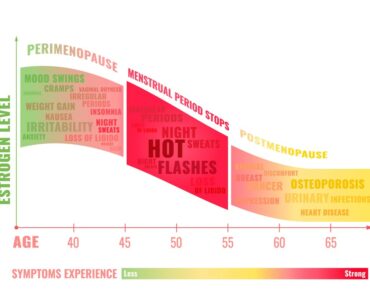Is Menopause Aging? 
When we talk about menopause, people often consider it synonymous with old age. However, although this stage of women’s lives occurs due to the natural decline of the female body’s reproductive function and is certainly related to age, it does not represent the onset of old age.
Menopause usually occurs in most women around middle age. It is also true that some women accept this synonymy and consider themselves old once they have crossed the bridge.
As we have discussed in other articles, menopause is medically defined as the point in life when menstruation stopped. To say that you are in menopause, 12 months must have elapsed since the last (menstrual) bleeding recorded. This stage of their lives is also characterized by events that have a crucial impact on women’s physical, mental, and spiritual health. To mention a few, it is common for children to come of age and are away from home; You may be caring for elderly parents with health conditions, or the time has come to grow in your career or consider retirement; You may begin to notice changes in your relationship with your partner that you may not have noticed before.
All of this can influence how you experience menopause and the long phase that precedes it, perimenopause. Although changes in your periods are caused by fluctuations in hormones, other symptoms, such as memory loss and mood disorders, are likely the result of a combination of factors, including life stress and anxiety. This article will refer to memory loss and mood disorder, two symptoms that may significantly impact your life.
Mood problems: depression and anxiety.
Let me tell you that if you feel depressed or notice that you get irritated by anything, or are often anxious, you are not alone. One in four women experiences mood swings, such as depression or anxiety, during perimenopause and menopause.
However, as with sleep, it is not clear whether hormonal changes are the cause. Research suggests that severe hot flashes and night sweats, which disrupt sleep and daily activities, contribute to depression more than the estrogen’s decline. Women who have had depression in the past or who have experienced significant life stress, such as abuse, are also at higher risk.
If you have depression, irritability, or other mood disorders, you have many options for help. Keep reading because here, you will find interesting ways to manage this from the comfort of your home.
How To Deal With Your Mood?

Since you’ve made it this far, let me tell you that if you are struggling with anxiety, depression, or other mood problems, and you feel like you can’t control it, you should talk to your doctor about treatment options.
Generally speaking, there are two essential ways to manage mood: through medication and therapy. Sometimes they are more effective in combination.
Personally, I think that medications can take a while to work, and they all have side effects. Even so, it will offer faster relief than psychotherapy. And if you find the most suitable one, the relief can be enormous. Also, other problems, such as difficulties sleeping, irritability, and concentration problems, are alleviated.
Antidepressants are the most common medications prescribed by doctors to manage anxiety and depression. There is a long list that you can discuss with your doctor. All are equally effective, although people may respond better to some than to others.
Your doctor may advise you to perform some tests to identify which is the best option. The use of antidepressants for extended periods is never recommended as they can produce tolerance and create addiction.
My best solution was in a coaching program where they helped me recognize negative thinking and then find ways to rethink a situation more positively to better cope. During those wonderful 90 days, they trained me to mend my personal relationships and find better ways to interact with other people.
They helped me recognize how my past relationships and experiences could be affecting the way I interacted with people today. Then you learn ways to confront unresolved emotions and heal from past hurts so that you can be happier in the present.
This wonderful experience was the top of my decision to switch my medical career towards coaching, to help other women who like me have difficulty on the road to menopause.
Memory Loss…Really?

The other problem I want to refer to is the apparent loss of memory and concentration. It may seem to everyone that perimenopause and menopause cause memory and concentration problems.
Guess what? Actually, the most likely culprits are waking night sweats, other sleep problems, stress, and trying to juggle too many things at once. After all, if you are fatigued or your mind is full of priorities competing with each other, it will not be easy to focus on anything or retrieve a memory.
Those first signs of slipping memory can be a little alarming, especially if you know the route’s dreariness. You may first see it in your 40s or even younger, with memory loss symptoms like slower facial recall or where you left your keys.
What groceries were you supposed to buy? Wait, you forgot your grocery list at home.
The first steps to improving your ability to concentrate and remember things include addressing menopause and stress symptoms. Once you take care of these basics, there are other options. Many books, smartphone applications, and online programs promise to help increase memory and concentration. These usually involve solving puzzles and taking tests that exercise your brain.
But, let’s be more specific about this.
How To Memorize
While it’s normal to forget things occasionally, it’s a pattern to watch. It is all about keeping your brain active. Challenge your memory just like a muscle; give your brain a good workout daily with these memory-boosting tips:
Use Your Memory Daily
Your brain needs a workout, just like the rest of you. It’s a case of “use it or lose it,” so use your brain every day. Try crosswords, for example, or read a section of the newspaper you’d normally skip. You might also take a different route to work, for example, or learn another language or play a musical instrument.
See Your Friends
You’re not an island, dude. Depression and stress can both lead to memory loss, which is why you’ll want to socialize often, especially if you live alone. Be with others and take them up on their invitations. Life gets better when you do.
Organize Your Life!
You lose points with a cluttered home because you’re more likely to forget stuff. Make lists and notes of appointments and things to do in a special notebook or on your calendar. Heck, download an app on your iPod and write down what needs to get done. Speak it out loud, too, to reinforce it in your memory, and check-off your tasks when completed.
While we’re on the subject, try to stay focused on the task at hand and limit distractions. You’re more likely to recall information if you concentrate specifically on that rather than multi-tasking. Put another way, focus on what you want to remember later, and you’re in better shape to remember it quickly.
Sleep Well
Shut-eye helps your memory. Most adults need seven to eight hours of sleep each night. Make time for adequate rest- go to bed earlier if you have to, and work on your sleep hygiene. Your memory will thank you when you try to remember stuff the next day.
Eat Healthily
Do you see a pattern here? Your memory likes healthy living. That extends to your diet, with plenty of fruits, vegetables, and whole grains. Opt for low-fat protein, like fish and skinless poultry. Drink plenty of water too, and watch the alcohol intake.
Exercise Daily
This boosts blood flow throughout your body. That includes your noggin. Aim for at least 150 minutes of moderate aerobic activity (like walking) each week, says the Department of Health and Human Services, or 75 minutes of something with greater intensity, like jogging, though even a few 10-minute brisk walks per day will suffice in a pinch.
Stay in Touch With Your Doctor
Chronic conditions can affect your memory, to say nothing about the rest of your health. So follow your doctor’s recommendations, be it for depression, your kidneys, or anything else in your medical history. Review your medications often with your doctor as well – some medications can reduce your memory.
Try Brain Pill
I can’t end an article on how to improve your memory without mention of Brain Pill natural memory supplement. That’s because it’s simply rocket fuel for your brain, a cognitive booster with clinically proven nootropics like cognizine, vinpocetine, and ginkgo biloba, which increase alertness and blood flow in your brain.
Studies also suggest the ingredients in Brain Pill enhance and may even protect memory. They don’t call it “Your Unfair Advantage” without good reason; better memory is linked to higher cognitive function. Your brain is more efficient with a sharp memory, which gives you better intelligence and the financial and social rewards that go with them.
Try Brain Pill to improve your memory 
Combine it with the memory-boosting tips we’ve discussed in this article, and you really do have an unfair advantage. Your memory will like it too, and you may finally have a solution to that pain-in-the-butt issue of where you left your keys!
Conclusions
As difficult as perimenopause and menopause can be, you are likely to find a way to deal with the challenges with persistence. Please work with your doctor and your coach to manage symptoms as they arise. And pay attention to what else is going on in your life, as stress and life changes can also contribute to what you are experiencing. It may not seem so at times, but the transition into menopause offers you a chance to begin a new chapter in your life.








This is truly a great article on the topic that usually not discussed. Yet, it is inevitable in every woman’s life. It should be a time of celebration in that the monthly cycles are no more. However, most women think about it as something to dread which causes them to go through the symptoms in silence. The suggestions given here are spot on. Mood swings and memory loss are real and to many, they are scary. The tips you give are great. The two that resonates with me is, organize your life and take a brain pill. Thank you for sharing this viable information.
Thank you, Ms. Patricia Bracy! I appreciate your comment, and the fact that you found my article useful makes me happy. Definitely, if you would like to boost your memory, the brain pill is my recommendation.
Having the feeling that all you have been able to gather is Lost and you’re blank is very bad and it makes you feel very lonely z I’ve read about different experiences and how they feels. It’s very thoughtful of you to share this helping advices as d it’ll be very useful to many people. Thank you for this
Hey Bolt,
I’m glad this article fulfills its purpose of raising awareness about these issues. Thank you very much for reading it, and I hope you can help people who are going through this stage, especially women in your circle of friends and family.